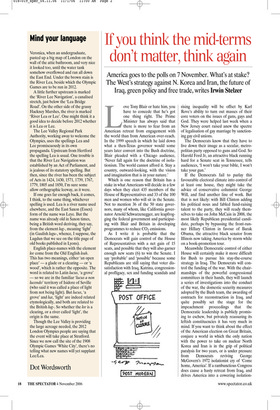Mind your language
Veronica, when an undergraduate, pasted up a big map of London on the wall of the attic bathroom, and very nice it looked too, until the water tank somehow overflowed and ran all down the East End. Under the brown stain is the River Lea, beside which the Olympic Games are to be run in 2012.
A little further upstream is marked the ‘River Lee Navigation’, a canalised stretch, just below the ‘Lea Bridge Road’. On the other side of the grassy Hackney Marshes, the river is marked ‘River Lea or Lee’. One might think it a good idea to decide before 2012 whether it is Lea or Lee.
The Lee Valley Regional Park Authority, working away to welcome the Olympics, uses the spellings Lea and Lee promiscuously in its own propaganda. Upstream from Hertford the spelling Lea is usual. One trouble is that the River Lee Navigation was established by an Act of Parliament, and is jealous of its statutory spelling. But then, since the river has been the subject of Acts in 1424, 1430, 1571, 1739, 1767, 1779, 1805 and 1850, I’m sure some allow orthographic leeway, as it were.
If one goes far enough back, it comes, I think, to the same thing, whichever spelling is used. Lea is a river name used elsewhere, and the East Saxon (Essex) form of the name was Leye. But the name was already old in Saxon times, being a British word deriving, they say, from the element lug-, meaning ‘light’ (in Gaulish lugu-, whence, I suppose, the Lugdun that we see on the title page of old books published in Lyons).
English place-names with the element lee come from the Old English leah. This has two meanings, either ‘an open place’ — a glade or a clearing — or ‘a wood’, which is rather the opposite. The word is related to Latin lucus, ‘a grove’ — so we are in the familiar ‘lucus a non lucendo’ territory of Isidore of Seville (who said it was called a place of light from not being light). But lucus, ‘a grove’ and lux, ‘light’ are indeed related etymologically, and both are related to the British lug-. So whether the lee is a clearing, or a river called ‘light’, the origin is the same.
Though the Lee Valley is providing the large acreage needed, the 2012 London Olympics people are saying that the event will take place at Stratford. Since we now call the site of the 1908 Olympic Games ‘White City’, there’s no telling what new names will yet supplant Lee/Lea.
Dot Wordsworth


















































































































 Previous page
Previous page